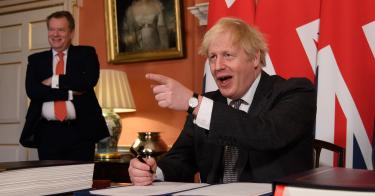Brexit Britain is economically resilient and well-positioned for a much-needed economic rebound, as the world’s seventh freest economy. That is one of the key findings of the just-released 2021 Index of Economic Freedom, an annual cross-country study by The Heritage Foundation.
2020 was an extraordinary year on many fronts, from public health policy to national security and economic policy. Over the past year, the global economy has been sorely tested, with the economic livelihood of billions of people severely disrupted by the most deadly pandemic in over a century, as well as by governments’ responses to it, in the form of lockdowns, travel bans, and lingering trade protectionism.
It is clear that the long-term solutions to our challenges do not lie in more government controls. They lie in a return to free-market principles. The development in record time of new vaccines by the ever-innovative, dynamic private sector promises to bring an end to the coronavirus crisis. American and British companies have been at the very forefront of vaccine development, and their work is literally saving the free world.
>>> Why the U.K. Is an Ideal Free Trade Partner for the U.S.
The UK economy entered 2020 with numerous challenges but also with fundamentally strong economic competitiveness in place. Key hurdles included negotiating a historic post-Brexit trade deal with the EU, weaker than expected productivity growth, and lingering regional economic development disparities. At the same time, the British economy was operating at full employment at the start of last year, inflation was under control, household and corporate debt burdens had fallen substantially since the global financial crisis in 2009, and the overall financial system was well-functioning, reinforced by market openness and regulatory efficiency.
Though the unexpected global pandemic, which originated in China, has taken a significant human and economic toll on the UK, the overall impact has been mitigated by a proactive and aggressive policy response. Two lockdowns and ongoing travel restrictions hit Great Britain’s economic activity hard, causing a sharp decline in GDP. But a robust fiscal, monetary, and financial strategy spearheaded by Boris Johnson’s government, afforded by the British economy’s strong fundamentals rooted in free-market pillars, has helped to hold down unemployment and insolvencies.
Once again, the doomsday predictions for the British economy since the 2016 Brexit vote have not materialized.
Significantly, the overall UK economy has proven remarkably robust, weathering downturns caused by the lockdowns and restrictions. Britain’s economy rebounded at 1 percent in the final quarter of 2020, as reported by the Office for National Statistics, while Germany grew at a mere 0.1 percent and the French economy contracted by 1.3 percent during the same period. And, as Reuters reported, “British firms fared less badly during February’s lockdown than feared and are upbeat about the prospects for growth later in 2021,” based on the most recent UK Purchasing Managers’ Index (PMI).
According to the 2021 Index, the UK remains “mostly free” as the seventh freest economy in the world. The British economy lost a little ground this year, but it retained its standing at a higher rank than fellow major Western G-7 economies, including the United States, Canada, France, and Germany.
There will be ample opportunity for greater economic freedom in the post-Brexit UK economy. Unshackled from the strictures of European Union bureaucracy, the British economy could register substantial improvements in key policy areas such as business freedom and trade freedom.
>>> World Sees Brexit U.K.’s Union Jack As What It Means to Be Great Again
Global Britain deserves to, and should become, a more dynamic enterprise hub because expanding trade and investment isn’t solely about market openness, though that remains crucial. It is also advanced by a strong rule of law, effective regulatory efficiency, and limited government size, areas where Britain performs far better than many of its regional European competitors.
From a broader foreign policy perspective, it is important to remember that the U.S.-UK partnership is the beating heart of the free world. Washington and London must work together to further enhance the Special Relationship between two of the world’s largest and freest economies. This includes moving swiftly forward with a historic bilateral trade deal that will not only facilitate economic recovery from the pandemic, but also further enhance investment and job creation on both sides of the Atlantic.
As the Heritage Foundation has argued, an Anglo-American trade and investment agreement will be a force generator for greater economic dynamism and prosperity, and will play a key role in reinvigorating the global free trade agenda. This is a unique opportunity the United States and Great Britain must seize to revitalize and upgrade the growth engines of the private sectors on both sides of the Atlantic.
The time to act and pursue greater freedom to trade and overall economic freedom is now.
This piece originally appeared in The National Interest https://nationalinterest.org/blog/buzz/america-and-brexit-britain-time-economic-alliance-180138





